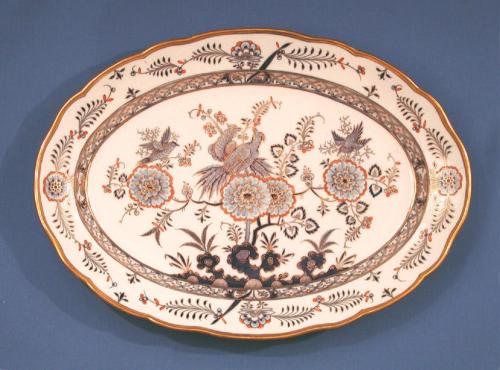Royal-Saxonian Porcelain Manufactory Meissen
German, 1806 - 1918
BiographyThe Meissen manufactory, established as the Saxon royal porcelain manufactory at Meissen near Dresden in 1710 under the patronage of Augustus II, Elector of Saxony and king of Poland, was the first factory in Germany to discover the ingredients to true hard paste porcelain. It remained the dominant porcelain manufactory in Europe until about 1750, when its fame was eclipsed by the royal French porcelain manufactory at Vincennes (later Sèvres).
The Royal Porcelain Manufactory in Meissen, Germany first used the underglaze blue crossed swords mark in 1722. Variations of this mark are still being used by the factory. The mark has been copied by many other compnies.
History of the Meissen Porcelain Manufactory (from the company website):
23 January 1710 Proclamation by the Saxon Court Chancellery in a "supreme decree" in Latin, French, German, and Dutch of the invention of porcelain
6 June 1710 Founding of the Porzellan-Manufaktur Meissen in the Albrechtsburg hill fort at Meißen.
Adoption of the "crossed swords" mark in 1722
1763-1806 Electoral-Saxonian Porcelain Manufactory Meissen
1806-1918 Royal-Saxonian Porcelain Manfactory Meissen
1861 to 1864 Construction of present facility in Meissen's Triebischtal valley
from 1918 on Staatliche Porzellan-Manufaktur Meissen - Porcelain Manufactory Meissen owned by the state.
1950-1990 VEB Staatliche Porzellan-Manufaktur Meissen
from 1990 on Staatliche Porzellan-Manufaktur Meissen GmbH i. A.- Porcelain Manufactory Meissen Ltd.
since 26 June 1991 Staatliche Porzellan-Manufaktur Meissen GmbH (sole shareholder: Federal State of Saxony)
The Royal Porcelain Manufactory in Meissen, Germany first used the underglaze blue crossed swords mark in 1722. Variations of this mark are still being used by the factory. The mark has been copied by many other compnies.
History of the Meissen Porcelain Manufactory (from the company website):
23 January 1710 Proclamation by the Saxon Court Chancellery in a "supreme decree" in Latin, French, German, and Dutch of the invention of porcelain
6 June 1710 Founding of the Porzellan-Manufaktur Meissen in the Albrechtsburg hill fort at Meißen.
Adoption of the "crossed swords" mark in 1722
1763-1806 Electoral-Saxonian Porcelain Manufactory Meissen
1806-1918 Royal-Saxonian Porcelain Manfactory Meissen
1861 to 1864 Construction of present facility in Meissen's Triebischtal valley
from 1918 on Staatliche Porzellan-Manufaktur Meissen - Porcelain Manufactory Meissen owned by the state.
1950-1990 VEB Staatliche Porzellan-Manufaktur Meissen
from 1990 on Staatliche Porzellan-Manufaktur Meissen GmbH i. A.- Porcelain Manufactory Meissen Ltd.
since 26 June 1991 Staatliche Porzellan-Manufaktur Meissen GmbH (sole shareholder: Federal State of Saxony)
Person TypeCorporate Entity
French, about 1915 - 1932
English, 17th century-present
French, founded 1902
American, 1892 - 1903
American, 1879 - 1909
American, 1832 - 1843












